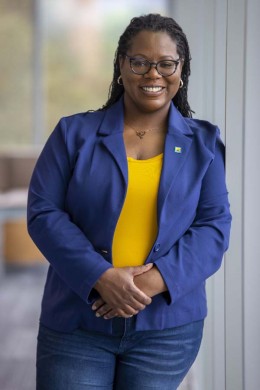Healthcare's Great Communicators
 In a recent study, Assistant Professor Sheria Robinson-Lane, Ph.D., RN, MHA, and her team showed that Black COVID-19 patients received less medical follow-up, longer delays returning to work and higher rates of hospital readmissions. The findings come from the kind of research Robinson-Lane has built her career on, highlighting the health disparities faced by far too many and presenting novel solutions to improve care for the most vulnerable. With new tools and approaches she’s developed in a unique U-M faculty fellowship, Robinson-Lane is working to engage a broader audience — including state and national policymakers — around her life’s work, demonstrating how nurses can be some of the most impactful advocates for health equity.
In a recent study, Assistant Professor Sheria Robinson-Lane, Ph.D., RN, MHA, and her team showed that Black COVID-19 patients received less medical follow-up, longer delays returning to work and higher rates of hospital readmissions. The findings come from the kind of research Robinson-Lane has built her career on, highlighting the health disparities faced by far too many and presenting novel solutions to improve care for the most vulnerable. With new tools and approaches she’s developed in a unique U-M faculty fellowship, Robinson-Lane is working to engage a broader audience — including state and national policymakers — around her life’s work, demonstrating how nurses can be some of the most impactful advocates for health equity.
Family foundation
Robinson-Lane is dedicated to improving quality of life for diverse older adults with chronic illnesses through culturally responsive care practices and community-based participatory research. She draws inspiration from her grandmother, Lula, who lived to age 98 while defying the odds of her Alzheimer’s disease diagnosis. “As a nurse, it was fascinating to see the stark contrast between the way she was aging in place in her home, in her community, surrounded by people she loved compared to those were much younger with a number of health conditions that led them into long-term care,” Robinson-Lane said. A former nurse administrator and hospice educator, Robinson-Lane shifted her career to focus on research, exploring the impacts of systems and social structures on individual health with a commitment to reducing health disparities through community-engaged science.
“I saw how being part of a community and having a deep sense of spirituality helped people dealing with pain. It shaped my view of nurses, physicians and providers as partners in care,” she said.
Growing as an advocate
Earlier this year, Robinson-Lane joined the 2021 cohort of U-M’s Public Engagement Faculty Fellowship. The program helps faculty members improve their public engagement practice across domains including communications and media engagement, community-engaged research and service, industry partnerships, government relations and more. As a mentor fellow, Robinson-Lane shared her insight with counterparts across disciplines. In the process, she began to think differently about the messaging surrounding her research, exploring new ways to present her work and become a more effective advocate.
“I really wanted to focus on how I can move my work into policy from the very beginning, not just something that appears in a journal or ends up as a soundbyte,” she said. “How do we start to move these ideas and results we’ve spent so much time developing into something that actually makes a difference for people?”
To expand its impact, Robinson-Lane knows she has to make her research relatable to a larger audience. “I think nurses have a unique ability to translate science in ways that other disciplines don't, because so much of our work is helping a regular person understand what's happening to them and normalizing that process,” she said. “I think the fellowship allowed me to take different approaches and articulate science in ways that are more meaningful to individuals.”
“I think nurses have a unique ability to translate science in ways that other disciplines don't, because so much of our work is helping a regular person understand what's happening to them and normalizing that process.”
— Sheria Robinson-Lane, Ph.D., RN, MHA

Troubling Trends
Lessons from the fellowship came into play quickly, as Robinson-Lane’s latest research garnered national media attention and spread across social media. In “Race, Ethnicity, and 60-Day Outcomes After Hospitalization With COVID-19,” published in the Journal of the American Medical Directors Association, Robinson-Lane and her coauthors examined health disparities in 2,217 COVID-19 patients discharged from Michigan hospitals in the past year and evaluated 60-day patient outcomes by race and ethnicity. They found that nonwhite patients were most likely to be readmitted to the hospital within 60 days of release. Black patients, in particular, were less likely to receive accommodations in their workplace due to ongoing health issues, including long COVID symptoms such as fatigue, weakness, shortness of breath and persistent cough.
The study not only illustrates the long-term challenges COVID-19 patients face after hospitalization but the longstanding biases individuals of color encounter in the health system.
“In at least one study of COVID emergency room visits, which we cited in our paper, patients most likely to be sent home from the emergency room and then readmitted within 72 hours after presenting with COVID symptoms were Black,” Robinson- Lane told Michigan News. The research also showed that Black patients experienced the lowest physician follow-up after discharge. Changes to the post-discharge process can be crucial to improving outcomes for Black patients. “It’s important for providers to identify a family caregiver early and make sure they're part of the discharge planning process,” Robinson-Lane said. “It also starts with questions surrounding social determinants of health, but providers have to know about support available within the community. Do you have transportation to get to your follow-up appointment? Do you have a way to connect for a telehealth visit? If individuals are keeping up with their appointments, they're less likely to be hospitalized again.” The study also highlighted a glaring need for more accurate demographic data. “We have a large population of North African/Middle Eastern individuals who aren’t classified within the medical record system,” she said. “There’s also a large issue identifying people who are multiracial and biracial.” Findings from the study like these and others piqued the interest of state and national lawmakers, focused on understanding the racial and ethnic impacts of COVID-19.
Reaching policymakers
 Robinson-Lane was invited to present her findings to the Michigan Coronavirus Task Force on Racial Disparities on Oct. 8. The task force, led by Michigan Lt. Gov. Garlin Gilchrist II, comprises state lawmakers, health officials and community stakeholders who aim to increase transparency in reporting data on the racial and ethnic impact of COVID-19, remove barriers to accessing health care and reduce the impacts of medical bias in testing and treatment. Thanks to the fellowship, Robinson-Lane brought a revitalized approach to her presentation. “Health disparities are often presented in terms of what's wrong with the population, why they're responsible for a problem and how they need a savior to help them,” Robinson-Lane said. “I wanted to communicate by leveraging the strengths of a community, outlining the contextual factors that influence health outcomes and putting that into a policy perspective that can lead to sustainable solutions.” Robinson-Lane focused on systemic issues identified in her research which can be addressed through public policy. “Why do we have this large category of people whose race and identity we can’t identify, and why don't we know any information about the disability status of these individuals?” she asked. “These are critical things we have to know about in order to help those who need it most. If the state requires that reporting, the health systems will figure out a way to make it happen.” Robinson-Lane also addressed clinical approaches that could mitigate troubling trends. “How do we develop more COVID-19 clinics across the state, where individuals can receive specialized support once they've been discharged. These clinics can also serve as information hubs for people if they have questions about their symptoms or how to find services for a disability resulting from those symptoms,” she said.
Robinson-Lane was invited to present her findings to the Michigan Coronavirus Task Force on Racial Disparities on Oct. 8. The task force, led by Michigan Lt. Gov. Garlin Gilchrist II, comprises state lawmakers, health officials and community stakeholders who aim to increase transparency in reporting data on the racial and ethnic impact of COVID-19, remove barriers to accessing health care and reduce the impacts of medical bias in testing and treatment. Thanks to the fellowship, Robinson-Lane brought a revitalized approach to her presentation. “Health disparities are often presented in terms of what's wrong with the population, why they're responsible for a problem and how they need a savior to help them,” Robinson-Lane said. “I wanted to communicate by leveraging the strengths of a community, outlining the contextual factors that influence health outcomes and putting that into a policy perspective that can lead to sustainable solutions.” Robinson-Lane focused on systemic issues identified in her research which can be addressed through public policy. “Why do we have this large category of people whose race and identity we can’t identify, and why don't we know any information about the disability status of these individuals?” she asked. “These are critical things we have to know about in order to help those who need it most. If the state requires that reporting, the health systems will figure out a way to make it happen.” Robinson-Lane also addressed clinical approaches that could mitigate troubling trends. “How do we develop more COVID-19 clinics across the state, where individuals can receive specialized support once they've been discharged. These clinics can also serve as information hubs for people if they have questions about their symptoms or how to find services for a disability resulting from those symptoms,” she said.
In addition to her presentation to state officials, Robinson-Lane was contacted to speak to counsel to the House Select Subcommittee on the Coronavirus Crisis. Led by Chairman James E. Clyburn, Majority Whip U.S. of the House of Representatives, the subcommittee was established on April 23, 2020 to examine a wide range of issues related to the coronavirus crisis. Her research will be most useful to the subcommittee’s task of examining any disparate impacts of the coronavirus crisis on different
communities and populations, including with respect to race, ethnicity, age, sex, gender identity, sexual orientation, disability and geographic region, along with any measures taken to address such disparate impacts. Robinson-Lane understands it’s going to take sustained engagement for her work to shape systemic solutions, and new conversations can start with a simple message that’s helped guide her career. “When we promote equitable care, it benefits everybody,” she said. “If we can make sure that the most vulnerable among us are cared for, that means we’re all cared for.”
Make a gift to support research endeavors at the U-M School of Nursing.





